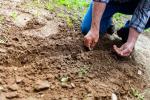LIFE Project: Carbon Removal and Peri-Urban Agriculture Governance Scheme for a Sustainable Food System
- Type Project
- Status In progress
- Execution 2023 -2028
- Assigned Budget 2.073.206,00 €
- Scope Europeo
- Autonomous community País Vasco
- Main source of financing LIFE
- Project website Web del proyecto
The CROPS4LIFE project aims to transform Vitoria-Gasteiz's social model by achieving a sustainable and decarbonized food system. The facilitation of short-circuits based on the marketing of local foods produced with low-impact solutions seeks both market equity (provision of healthy, sustainable products at an affordable price) and the reduction of GHG emissions, thereby minimizing the environmental and climate footprint of the system as a whole.
The city of Vitoria-Gasteiz's commitment to changing its food system began with its declaration as the European Green Capital in 2012. At the time, it sparked a debate among local stakeholders about the state of agriculture in the Llanada Alavesa and its lack of connection with the municipal food supply model. This movement crystallized in a manifesto for a more sustainable agri-food system, which was adopted by the City Council in 2004 as an institutional objective, and from there, work began on the Vitoria-Gasteiz Agri-Food Strategy.
In this context, in 2021, the Vitoria-Gasteiz City Council's Environmental Studies Center (CEA) commissioned a study aimed at quantitatively understanding the state of the issue. The City Food Flow Analysis Vitoria-Gasteiz (CFFA) study was designed to answer the question of what proportion of fresh food products consumed in the city are of local origin (i.e., those produced in the province of Álava). The results of the study were conclusive: only 1.5% of fresh products were of local origin.
- Promote behavioral change in the population's food purchasing habits by quantifying the product's productive and environmental profile and incorporating it as a purchasing decision factor (modifying the food choice environment).
- Demonstrate the economic viability of a short digitalized production-marketing channel through the articulation of a local agri-food innovation niche capable of operating digitalized production and marketing within the biophysical limits of the planet.
- Ensure the social viability of short production-marketing cycles through a framework of innovation and digitalization to attract new social actors to regenerative agriculture, and foster the replication and dissemination of its impacts by creating cooperation strategies with conventional farmers.
- Promote the operational, administrative, and legal viability of the sustainable transition of the Vitoria-Gasteiz agri-food system through the implementation of an adaptive digital governance model.
- 10% increase in consumption of fresh local food in the city of Vitoria-Gasteiz by the end of the project.
- Substantial qualitative modification of the food choice environment by introducing a minimum of three events and five environmental variables during the production cycle in reference to the thresholds for safe resource use within planetary boundaries.
- Changing the food choice environment through a direct appeal to the consequences of individual food purchasing actions, reflecting their impact on the social metrics of decarbonization.
- Changing the food choice environment through a positive identity appeal to improve the position of the historical territory of Álava with respect to the indicators of planetary biophysical limits.
- Increase of 22 ha of regenerative agriculture at the end of the project (30 ha five years later).
- Productive diversification. Inclusion of up to five different regenerative agriculture production systems within a single farm (biointensive horticulture, extensive horticulture, extensive crops, diversified livestock farming, and forest management).
- Increase in quantifiable biodiversity indices throughout the project's implementation. Increase in the number of species from one to twenty.
- Reduction of soil erosion in an area of 0.3 km2
- 45% reduction in energy consumption in the project area.
- 41% reduction in CO2 emissions in the project area.
- 4% increase in CO2 sequestration at the end of the project in the project area.
- 100% reduction of pesticides in the project area.
- 100% reduction in nitrogen use in fertilization practices at the end of the project in the project area.
- 100% reduction in phosphorus use in fertilization practices by the end of the project in the project area.
- 30 local producers integrated into the marketing model of the Km.0 digital food aggregator (ADA 0) at the end of the project.
- Incorporation of at least 20 producers into agricultural activity around the city of Vitoria-Gasteiz and, in particular, the scaling up of the self-sufficiency component of the program promoted by CROPS4LIFE.
- 15 new ventures in the agricultural sector, whether individual or cooperative.
- Four workshops to condense the knowledge generated by the project for its projection into the regulatory framework.
- Five distinct areas of expertise are represented in the development of a set of recommendations for their projection into a potential package of proximity policies.
- Coordinator/entity name: María de Santiago
- Postal address: HOUSE OF THE DEHESA DE OLARIZU, 01006, VITORIA GASTEIZ
- Coordinator/entity email:
- CENTRO DE ESTUDIOS AMBIENTALES
- Ayuntamiento de Vitoria-Gasteiz
- AMATERRA SOCIEDAD LIMITADA
- SUSTRAIAK HABITAT DESIGN KOOP ELK TXIKIA
- NEIKER-INSTITUTO VASCO DE INVESTIGACION Y DESARROLLO AGRARIO SA
- DIPUTACION FORAL DE ALAVA
- ERAMAN REPARTO KOOP ELK TXIKIA
- CHAVES PADILLA
- FRANCISCO JAVIER
- COOPCYCLE







